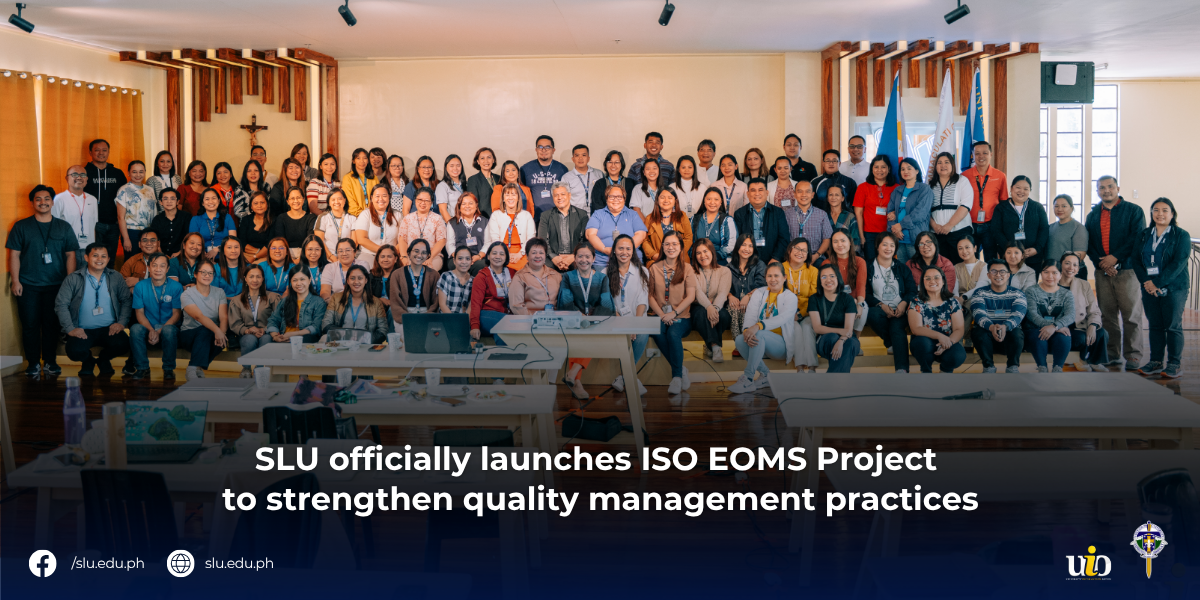Saint Louis University (SLU) through the Office of Institutional Development and Quality Assurance (OIDQA) officially launched the International Organization for Standardization (ISO) Educational Organization Management System (EOMS) Project in alignment with ISO 21001:2018 standards.
The two-day initiative, from 19 to 20 June 2025 at the Cardinal Cardijn Hall in the SLU Student Residence Halls, is a pivotal milestone in the university’s commitment to a robust and effective Quality Management System (QMS). It features targeted training sessions designed to align their functions with EOMS core principles. Key participants include Process Owners (PO), Unit Document Controllers (UDC), and Internal Quality Auditors (IQA), all of whom play crucial roles in maintaining quality standards and institutional accountability.
Mr. Hector L. Martin, OIDQA Director, ushered in the program by presenting the updated EOMS policy manual, which was first introduced during the EOMS project kick-off in January 2025. The manual was formally endorsed through a ceremonial signing led by the SLU Administration through the Vice President for Administration, Atty. Shellah Yzanne P. Merced.

The signing was witnessed by School of Teacher Education and Liberal Arts (STELA) Dean Mary Pauline E. Namoca, PhD, RPsy; School of Advanced Studies (SAS) Dean Faridah Kristi Wetherick, PhD; School of Engineering and Architecture (SEA) Dean Engr. Jeffrey Des Binwag; and School of Medicine (SOM) Dean Dr. John Anthony Domantay, PhD.
The orientation of POs, UDCs, and IQAs followed, serving as a comprehensive introduction to the objectives, scope, roles, responsibilities, and implementation roadmap of the ISO EOMS-aligned QMS.
Mr. Teodoro V. Ramirez, Jr., Principal Consultant of AGF Consulting Group and resource person, discussed the key elements of ISO 21001:2018 Educational Organization Management System (EOMS), focusing on Documented Information as outlined in Clause 7.5. He further elaborated on several essential topics critical to implementing and maintaining an effective Quality Management System. These included Annex SL, which prescribes the standardized high-level structure for all ISO Management System Standards (MSS); the Plan-Do-Check-Act (PDCA) Cycle, a four-step method used to drive continuous improvement; Document Control Procedures to ensure consistency and accuracy of information; the Process Approach, which emphasizes managing interrelated activities as systems; and Knowledge Transfer, which supports organizational learning and sustainability.

Ramirez emphasized that “documentation is the trademark of your business process” and a fundamental part of best practices. Proper documentation ensures that standards are clearly defined and can be consistently applied across the organization. He also highlighted the importance of the Process Approach, describing it as a series of reproducible, interrelated activities that transform inputs—such as people, resources, or materials—into outputs that meet customer expectations. “The essence of quality is how operations are managed,” he said, underscoring that understanding and optimizing each process is key to ensuring consistent, high-quality outcomes across the institution.


The series of EOMS training will continue on 20 June 2025, focusing specifically on the capacity-building needs of Process Owners (POs) and Internal Quality Auditors (IQAs).
With the successful implementation of this initiative, SLU reaffirms its commitment to operational excellence and quality management, ensuring that its systems and practices meet international standards for quality education. This aligns closely with the United Nations Sustainable Development Goal 4 (Quality Education). Also, by strengthening institutional processes and accountability, SLU contributes to SDG 16 (Peace, Justice, and Strong Institutions).










